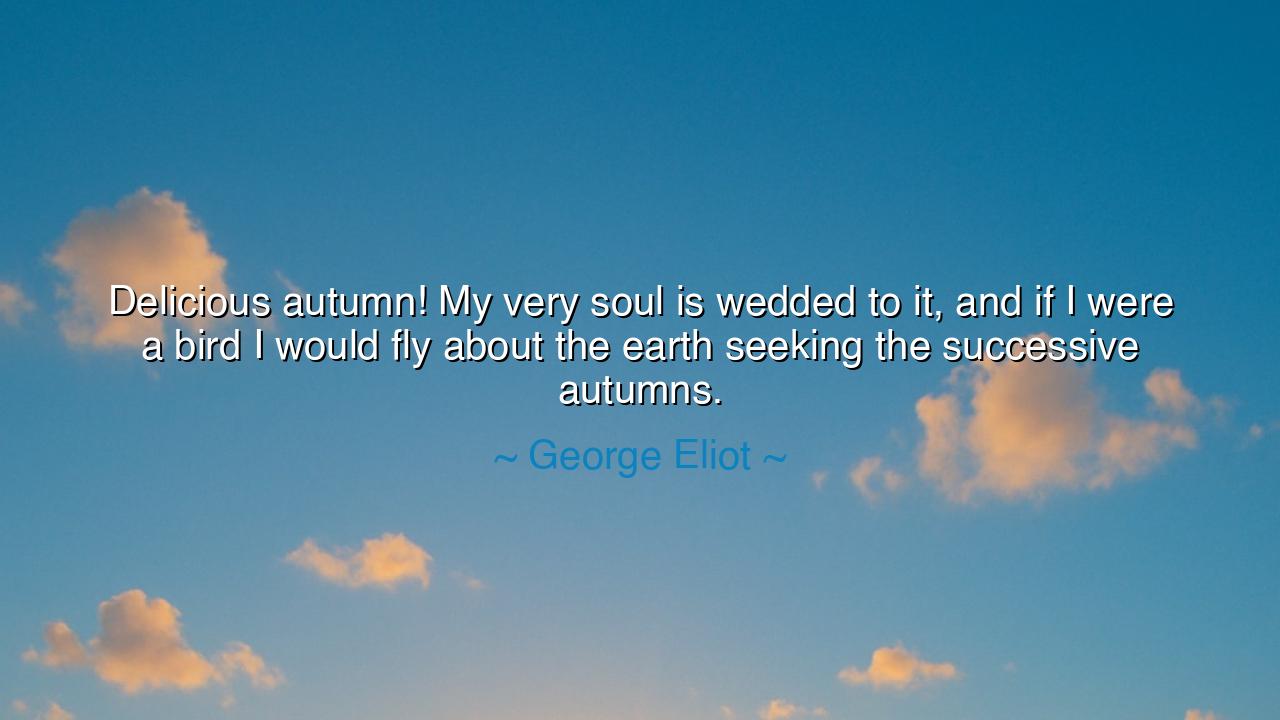
Delicious autumn! My very soul is wedded to it, and if I were a
Delicious autumn! My very soul is wedded to it, and if I were a bird I would fly about the earth seeking the successive autumns.






Hear the exclamation of George Eliot, whose pen revealed the secret movements of the human heart: “Delicious autumn! My very soul is wedded to it, and if I were a bird I would fly about the earth seeking the successive autumns.” In this cry we hear not only a love of season, but a deep union of spirit with the rhythms of the world. For in autumn, with its richness of color and its mingling of beauty and decay, Eliot saw a truth that spoke to her innermost being—the joy of transformation, the glory of change, the sweetness of impermanence.
The meaning is profound: autumn is the season of paradox. It is the time when leaves burn with the fire of red and gold, even as they fall to the earth. It is the moment when the harvest is gathered, when abundance and loss walk hand in hand. To be wedded to autumn is to embrace this paradox, to love not only the fullness of life but also its passing, to see beauty not only in beginnings but also in endings. Eliot, with her soul bound to this season, recognized that every fading leaf carries within it the promise of renewal, and that to cherish the fleeting is to live more deeply.
Consider the Japanese tradition of momijigari, the viewing of autumn leaves. For centuries, poets, monks, and common folk alike have traveled to the mountains to marvel at the crimson maples. They knew, as Eliot knew, that beauty is made more precious by its brevity. The fiery leaves last only a few weeks, yet in that time they fill the soul with awe. The people celebrated autumn not with sorrow at its passing, but with reverence for its gift. This is the spirit of Eliot’s words: to long for autumns wherever they may be, for they remind us of the sacredness of each moment.
History also gives us the story of Keats, the poet who, facing illness and an early death, wrote his great ode To Autumn. In it he praised the ripeness of the fields, the song of gnats, the quiet approach of dusk. For him, autumn was not the end, but the height of life, the season where fullness and decline met in perfect harmony. Eliot’s devotion echoes the same truth—that in autumn one finds the mystery of mortality turned to music, the fleeting turned to eternal.
The lesson is clear: to be bound in spirit to autumn is to live wisely. For life itself is an autumn, brief and radiant, its days colored with joy and sorrow, its years falling like leaves into the soil of memory. Yet to fear this cycle is folly; to embrace it is freedom. The soul that sees beauty in endings will never despair, for it knows that every ending carries within it the seed of a new beginning.
O children of tomorrow, hear this teaching: do not cling only to spring and summer, to the seasons of growth and abundance. Learn to love the autumns of your life—the times of change, of letting go, of ripening wisdom. See them not as losses, but as fulfillments. If you can delight in autumn, you can delight in every season, for you will have learned the secret of seeing beauty in all stages of existence.
Therefore, let your practice be this: walk in the autumn fields with open eyes, gather the colors in your heart, and let them remind you that life’s passing is not its diminishment, but its gift. If you are in a season of change, do not resist it; if you are in a season of decline, do not fear it. Instead, cherish it, for in the richness of its colors lies the essence of living well.
Thus Eliot’s words endure: “Delicious autumn! My very soul is wedded to it…” Let them remind you that the truest life is not found in clinging to the eternal summer, but in embracing every change, in loving even the fleeting, and in flying, like the bird of her longing, from one autumn to another, rejoicing in the endless wonder of life’s transformations.






AAdministratorAdministrator
Welcome, honored guests. Please leave a comment, we will respond soon